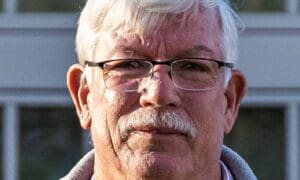Five criminal defendants will receive new trials because a former Superior Court judge and a former criminal defense attorney refused to acknowledge their affair, even in the months after they were caught in a sexual tryst in a subdivision under construction Oct. 2008 by a Fayette County Sheriff’s Deputy.
In the order, Senior Judge Harold G. Benefield noted that the secret relationship between former Fayette County Superior Court Judge Paschal English and his paramour, defense attorney Kim Cornwell, both of whom were married to others, created “a weighty entanglement.”
For starters, both English and Cornwell could have been cited for public indecency, Benefield suggested.
“So the judge and attorney now were at risk of having their relationship exposed to their spouses, to the State Bar of Georgia, to the Judicial Qualifications Commission, to her employer, to his constituents, to their professional colleagues and, of vast significance, to the prosecuting authorities of Fayette County, Georgia including the district attorney who might institute criminal proceedings against them. It is this mass of weighty entanglement, fraught with angst and the desperate necessity for concealment, which was brought into the courtrooms in which these ‘trials’ took place.”
The revelation of the deputy’s encounter with the couple came in May 2010 after The Citizen learned of an investigation into the affair ordered by Chief Superior Court Judge Christopher Edwards just days after English resigned from the bench.
Because the affair came to light after the trials concluded, there is no way the state nor the defendants could seek English’s recusal or new counsel based on that knowledge, Benefield noted.
“Only now, in utter hindsight, can the effort be made to determine the fairness of their proceedings in which it is surely indisputable that the most basic components of a fair trial were missing,” Benefield wrote.
English was required by judicial canons, case law and by the facts surrounding the affair to recuse himself, and the facts alone were enough to force an involuntary recusal had the affair come to light before or during the trials, Benefield noted.
“The facts, circumstances and potential for life altering consequences arising from the sexual relationship between the trial judge and the defense attorney at issue unquestionably, in my judgment, would have required voluntary recusal by Judge English,” Benefield wrote.
Cornwell likewise under the code of professional responsibility was duty-bound to disclose her relationship with English, Benefield wrote, “to apprise her client of any potential conflicts, causes of bias or other reasons for which the client might want her out of the case.”
“The client is entitled to know, without doubt, that it is his interests which the lawyer is seeking to protect and not those of herself and her lover-judge,” Benefield wrote.
Benefield notes that Cornwell and English asserted their right not to testify during a previous hearing on the motions for new trial.
Even after they were caught having intercourse by the sheriff’s deputy nearly a year before, English arranged to attend a drug conference in Reno, Nev. which Cornwell also attended in August, 2009. It was noted that not only had English failed to notify his secretary of those travel plans, but a month later he requested that a number of cases assigned to Cornwell be transferred to his courtroom from the other judges to whom the cases were first assigned, Benefield wrote.
The new trials ordered by Benefield include a pair of men who were convicted of carjacking a man in Fayetteville at gunpoint; another defendant accused of robbing a bank at gunpoint in Peachtree City; a defendant accused of molesting a young girl at a home in unincorporated Fayette County while he was staying with family after being released from prison; and a defendant accused of breaking into a home south of Fayetteville.
In each of those cases, the evidence of the defendants’ guilt was “overwhelming,” Benefield wrote, and the victims in each case have suffered trauma including one who has suffered “horrible physical and emotional damage” from the incident and resulting trial, Benefield noted. Nonetheless, there is no way the verdicts could be upheld, Benefield wrote, adding that he “would not be entirely displeased” if other judges ultimately reverse his decision.
The Fayette County District Attorney’s Office has already filed an appeal of the decision with the Georgia Court of Appeals.











Leave a Comment
You must be logged in to post a comment.